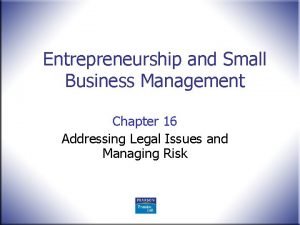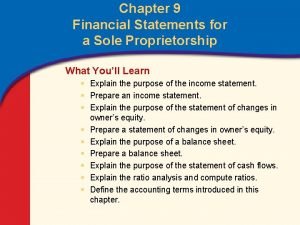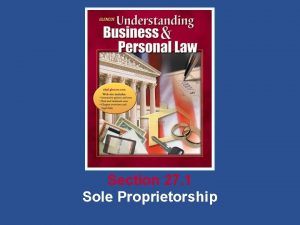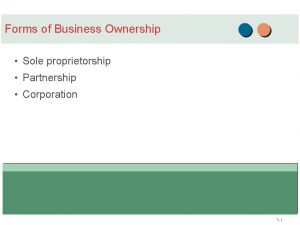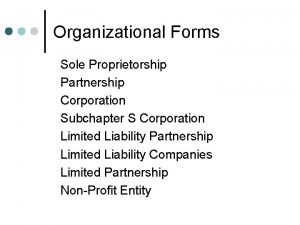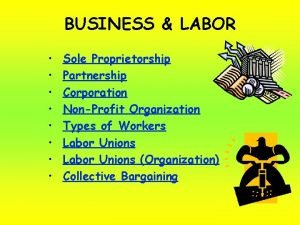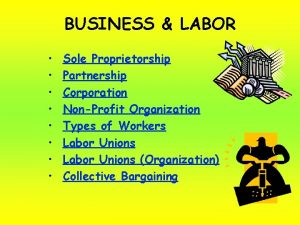Legal Forms of Organization Sole proprietorship General partnership












- Slides: 12

Legal Forms of Organization • Sole proprietorship • General partnership • Limited partnership • Nonprofit corporation • C corporation • S corporation • Limited liability company 12. 1 ™ Kauffman Center for Entrepreneurial Leadership ©© 2001 2004 Ewing Marion Kauffman Foundation PLANNING AND GROWING A BUSINESS VENTURE™

Sole Proprietorship Advantages • • • Easy to form No legal documents required Income tax on schedule C Profits/losses pass directly to owner Entrepreneur is the boss Disadvantages • • 12. 2 Unlimited liability Death terminates business Limits ability to raise capital Limits business deductions ™ Kauffman Center for Entrepreneurial Leadership ©© 2001 2004 Ewing Marion Kauffman Foundation PLANNING AND GROWING A BUSINESS VENTURE™

General Partnership Issues to consider • Money contributions • Money distributions • Business liabilities • Exit, buy-sell agreements 12. 3 ™ Kauffman Center for Entrepreneurial Leadership ©© 2001 2004 Ewing Marion Kauffman Foundation PLANNING AND GROWING A BUSINESS VENTURE™

Limited Partnership • General partner(s) and limited partner(s) • General partner(s) have full liability • Limited partners Liability debts limited to investment Limited financial obligations Limited say in management May receive favorable tax treatment 12. 4 ™ Kauffman Center for Entrepreneurial Leadership ©© 2001 2004 Ewing Marion Kauffman Foundation PLANNING AND GROWING A BUSINESS VENTURE™

Corporation Advantages • • Limited liability Creates stock Increases ability to raise capital Creates retained earnings Enjoys continual existence Is easier to sell Allows business expenses deductions Disadvantages • • 12. 6 Double taxation Corporate formation fees Regulations Paperwork Kauffman Center for Entrepreneurial Leadership ©© 2001 2004 Ewing Marion Kauffman Foundation ™ PLANNING AND GROWING A BUSINESS VENTURE™

S Corporation • Issues only common stock (voting and nonvoting) • Eliminates double taxation • Requires eligibility • Taxed as partnership (federal tax provision) 12. 7 ™ Kauffman Center for Entrepreneurial Leadership ©© 2001 2004 Ewing Marion Kauffman Foundation PLANNING AND GROWING A BUSINESS VENTURE™

Limited Liability Company • IRS treats like partnership • Liability debts limited to investment (like corporation) • More flexibility than a corporation regarding planning distributions and allocating profits and loses. • May have restrictions on admitting new members, permitting transfers of a member’s interest, the LLC’s ability to continue if a member withdraws 12. 5 ™ Kauffman Center for Entrepreneurial Leadership ©© 2001 2004 Ewing Marion Kauffman Foundation PLANNING AND GROWING A BUSINESS VENTURE™

Nonprofit Corporation • Exempt from federal income tax • Prohibited from distributing net income to members, directors, or officers • Required to file for status with IRS 12. 8 ™ Kauffman Center for Entrepreneurial Leadership ©© 2001 2004 Ewing Marion Kauffman Foundation PLANNING AND GROWING A BUSINESS VENTURE™

What form if…. . (1) What form if…. Minimize paperwork and lawyer involvement Sole proprietorship or General partnership Minimize Liability Corporation + Insurance with any form Never a general partnership Business must survive owners No sole proprietorship, No partnership Business is one shot deal Limited partnership Owner wants maximum control but needs partners First, limited partnership; second corporation Flexibility to trade ownership Corporation Need to pay some investors more than others Corporation ™ © 2001 Kauffman Center for Entrepreneurial Leadership PLANNING AND GROWING A BUSINESS VENTURE™

What form if…. . (2) What form if…. Flexibility to allocate profits and loses Limited Liability Company (LLC) It is clear the company will “lose” money Sole proprietorship, partnership, LLC It is clear the company will “make” money Corporation, may want to file for S corporation, LLC It is clear the company will grow and have many employees Corporation Minimize problems from mixing personal and business dealings Sole proprietorship The owner will want to sell the business Corporation ™ © 2001 Kauffman Center for Entrepreneurial Leadership PLANNING AND GROWING A BUSINESS VENTURE™

Remember…. What form if…. Liability You can deal with it through insurance No general partnership Legal assistance Better always. But specially when LLC, S corporation, limited partnerships Taxation considerations Will it lose money? Will it gain money? Corporate taxes are lower than high income personal taxes Growth businesses Corporation Mixing personal and business deals Keep things separate ALWAYS You can change the ownership structure ™ © 2001 Kauffman Center for Entrepreneurial Leadership PLANNING AND GROWING A BUSINESS VENTURE™

Test questions 1. One of the most significant disadvantages of a sole proprietorship is___ 2. The______ form of organization is mainly used for one-shot finite deals 3. ____is neither a corporation nor a partnership 4. One of the most significant disadvantages of a C corporation is____ 5. The S corporation is limited by___ 6. Nonprofit organizations qualify for exemption from____ True or false 1. Entrepreneurs in ventures in which there is little likelihood of liabilities being created often are advised that there is no need to incorporate 2. As the corporation pays more and more of its “profits” to the founder as compensation, he or she runs a risk of the IRS declaring the salary unreasonable and taxing it as though it were a corporate dividend 3. The S corporation has many advantages when the corporation is losing money ™ © 2001 Kauffman Center for Entrepreneurial Leadership PLANNING AND GROWING A BUSINESS VENTURE™
 Venn diagram of sole proprietorship and partnership
Venn diagram of sole proprietorship and partnership Venn diagram of sole proprietorship and corporation
Venn diagram of sole proprietorship and corporation Advantages of sole proprietorship
Advantages of sole proprietorship 10 advantages of sole proprietorship
10 advantages of sole proprietorship Sole proprietor disadvantages
Sole proprietor disadvantages Metropolitan bank
Metropolitan bank Advantages of sole trader
Advantages of sole trader 5 example of sole proprietorship
5 example of sole proprietorship Benefits of general partnership
Benefits of general partnership Sole proprietorship pros and cons
Sole proprietorship pros and cons Section 85 rollover journal entries
Section 85 rollover journal entries Chapter 9 financial statements for a sole proprietorship
Chapter 9 financial statements for a sole proprietorship Sole proprietorship
Sole proprietorship









